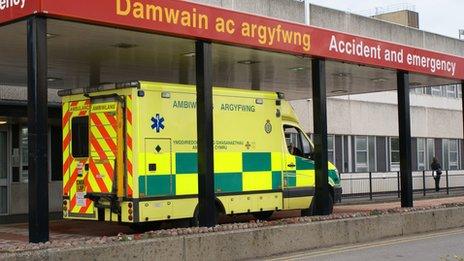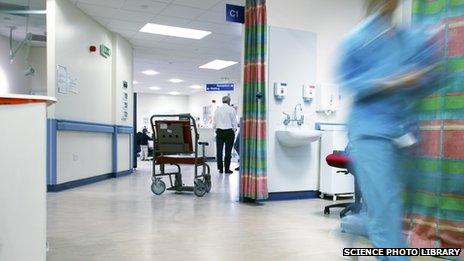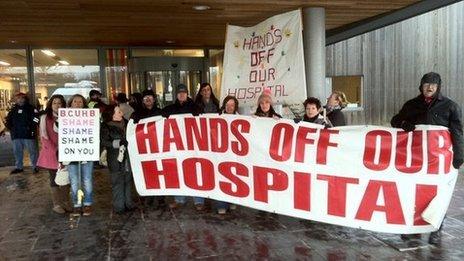Wales health: Challenging year for the NHS
- Published

Amublance targets have regularly cropped up in 2013
It has been a very challenging year for the NHS in Wales.
It is under intense pressure, with services being reorganised, financial constraints acute and many targets being missed throughout the year.
Also trust in the service has been dented on occasions after several concerns emerged about poor care.
DEMAND
It's a service that prides itself in dealing with pressure but the Welsh NHS, at times this year, has struggled to cope.
It began with a long, cold winter and an unprecedented demand for emergency care.
Hospitals were overwhelmed. A&E consultants warned of a meltdown. Ambulances queued and hundreds of planned operations were postponed.
The surge came at the end of the financial year as health boards were cutting millions of pounds worth of costs which, according to Professor Marcus Longley, director of the Welsh Health and Social Care Institute, added to the pressure.
"It's been a tough year and that's primarily because of the financial situation," he noted.
"The health service is now in its third year of an unprecedented squeeze in its finances.
"So we've got the recession and decisions taken in Wales not to protect the Welsh NHS to the same extent as the English NHS has enjoyed.
"And three years of that means a really tough squeeze."
The crunch coincided with Mark Drakeford's appointment as the new health minister in March.
He inherited a service seemingly lurching from crisis to crisis.
Targets were missed throughout the year and waiting times soared.
It meant that by the end of the year the performance of the Welsh NHS had become a political target, with UK Prime Minister David Cameron insisting the poor performance meant that the Welsh health service faced a crisis "every-day" under Labour's watch.
The response from Mr Drakeford was that the David Cameron's assessment was "grounded in ignorance and larded with arrogance".
SAFETY CONCERNS

Safety for patients has been questioned throughout 2013
The weather eased as spring turned to summer. But there was no let-up.
As the biggest measles outbreak in recent history subsided around Swansea, external, cases of Clostridium difficile (C. diff) in north Wales exposed big concerns about standards of care.
Several bosses at Betsi Cadwaladr University Health Board stepped down having lost the support of their own consultants.
Elsewhere, surgeons at Wales' biggest hospital - the University Hospital of Wales in Cardiff - branded some services dangerous, worried in particular about high death rates on cardiac waiting lists.
The neglect of an elderly patient in the Abertawe Bro Morgannwg Health Board area prompted a police investigation.
The case of a surgeon in Cardiff who had been suspended after the avoidable deaths of eight liver patients was also referred to the police.
Meanwhile the Welsh health watchdog claimed it could not be sure it could spot anything similar to the Stafford Hospital scandal in England happening here.
And critics claim death rates at Welsh hospitals are higher than they should be.
Morale hit
The negative headlines along with significant pressures had affected staff morale, according to Peter Meredith-Smith of the Royal College of Nursing in Wales.
"They don't always have the time they would want to give the care they would want," he said.
"That often puts them in a position whereby they are feeling the brunt of the frustration of the patients they are dealing with.
"Because when we talk about the frontline of the NHS in Wales, it's nurses that are the frontline.
"The biggest thing that needs sorting as far as our members are concerned is having enough staff of the right quality and calibre to deliver the services they know they're capable of delivering."
The stories of poor care led to a crescendo of calls for a wide ranging inquiry about NHS safety.
But in a recent BBC Wales interview with The Wales Report, the health minister reasserted his view that such an inquiry was not necessary.
"We have a web of different mechanisms which gives us assurance that things are as they should be - and show up early warning signals when they are not," Mr Drakeford said.
"At the moment I am satisfied that those different strands are operating in an effective way and that we don't need to go beyond that.
"Where things arise, where I do feel that there is a need for an independent outside look in order to provide public assurance, I will do that - and I've already done that."
NHS REORGANISATION

Protesters object to Betsi Cadwaladr health board proposals
Concerns about quality of care are some of the reasons why the NHS across Wales is being reorganised - with the aim of providing safe and effective care for the future.
Work on detailed plans has been under way for years. 2013 was meant to be the year they were delivered.
But progress has been slow and the process has been beset with setbacks and holdups.
In the Hywel Dda region serving mid and west Wales the health minister had to step in after board mangers and the patients' watchdog found themselves at loggerheads.
In north Wales an outcry from clinicians, campaigners and politicians prompted the first minister to review and revise a plan to change care for the sickest babies.
In south Wales, plans to centralise some specialist care at fewer large hospitals have been delayed yet again - this time until February.
Communication failures
According to Prof Longley, it is proof that the NHS has failed to an extent in persuading people of the case for change
"The health service hasn't said to the public 'this particular department, this particular hospital isn't good enough - we're going to change it because fundamentally it isn't delivering the quality of care'.
"I think people have been lulled into a false sense of security. They think, 'if I turn up at the hospital I could get the best possible care I could have' - and that isn't always the case.
"The NHS hasn't been good in communicating with the public. It's sort of taken them for granted."
But as 2013 draws to a close the question is are the vital signs improving?
For the first time in years, the Welsh government gave health a significant cash injection.
And although there are critics, Wales has led the way in legislating to introduce an opt-out system of organ donation.
Trust still strong
Despite so many negative headlines, Helen Birtwhistle of the NHS Confederation - the body that represents the Welsh NHS - argues public confidence in it remains high, external.
"We tend to forget this amongst the headlines - but most people have a really good experience of the NHS," she said.
"We have people working really hard who are compassionate and really care about the people the NHS is serving.
"There is no excuse ever for care that falls below standard but we know that the huge majority of NHS staff go to work to be caring and compassionate. That is everybody's top priority."
Despite the problems of 2013, it's clear Welsh NHS is not alone - healthcare systems across the UK and indeed the globe face similar pressures as medicine gets more advanced and patients grow older.
But it is fair to say that 2013 has been one of the most difficult and turbulent years in our health service's history.
The test in 2014 will be how well it responds.
- Published10 December 2013
- Published27 June 2013
- Published15 April 2013
- Published15 January 2013